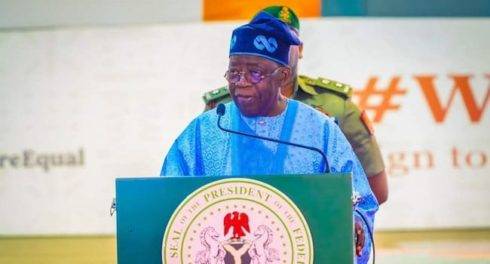President Bola Tinubu has called on governors to prioritize and achieve their targets on food security, emphasizing its critical importance for Nigeria’s sustainable development. Addressing the governors during a high-level meeting, President Tinubu highlighted the urgent need for enhanced agricultural productivity and food self-sufficiency. He underscored that food security is not just about agriculture but also involves addressing issues related to infrastructure, market access, and rural development.
President Tinubu noted that achieving food security would significantly reduce poverty and hunger, improve public health, and boost the overall economy. He urged state governments to implement innovative agricultural practices, invest in modern farming equipment, and provide adequate support to farmers. The President Tinubu also stressed the importance of public-private partnerships in achieving these goals, suggesting that collaboration between government bodies and private enterprises could lead to more efficient and sustainable agricultural practices.
Immediate Rollout of National Construction and Household Support Programme by President Tinubu
In a strategic move to enhance economic stability and provide immediate relief to Nigerians, President Tinubu has approved the rapid implementation of the National Construction and Household Support Programme. This initiative aims to stimulate the economy by creating job opportunities in key sectors such as agriculture, manufacturing, and construction. The programme will be implemented across all geo-political zones of Nigeria, ensuring comprehensive national coverage and impact.
Key infrastructural projects under this programme include the prioritization of the Sokoto-Badagry Highway. This critical road project will connect Sokoto, Kebbi, Niger, Kwara, Oyo, Ogun, and Lagos, facilitating smoother transportation of goods and services. Additionally, President Tinubu has sanctioned full counterpart financing for the Port Harcourt-Maiduguri Railway and the Ibadan-Abuja segment of the Lagos-Kano Standard-Gauge Railway. These rail projects are expected to enhance connectivity and boost economic activities across various regions, further contributing to national development.

Strategic Importance of the Sokoto-Badagry Highway
The Sokoto-Badagry Highway project is not only an infrastructural undertaking but a strategic move to bolster Nigeria’s agricultural sustainability. This highway will traverse significant agricultural zones, linking 216 agricultural communities, 58 dams, seven Special Agro-Industrial Processing Zones (SAPZs), and over a million hectares of arable land. The project aims to enhance the transportation network, thereby reducing post-harvest losses and improving market access for farmers.
By improving access to these key agricultural areas, the highway is expected to stimulate increased agricultural production, facilitate easier distribution of agricultural inputs, and ensure timely delivery of farm produce to markets. Furthermore, the development of this highway will likely attract investments in agro-processing and other related industries, creating a ripple effect that will benefit local economies and improve the livelihoods of rural communities. The project underscores President Tinubu’s commitment to a multifaceted approach to economic development, integrating infrastructure improvements with agricultural and rural development initiatives.
National Construction and Household Support Programme: Key Initiatives
Under the National Construction and Household Support Programme, the Nigerian government has announced a significant one-off allocation of N10 billion to states and the Federal Capital Territory. This allocation is earmarked for the procurement of buses and the implementation of the CNG (Compressed Natural Gas) uplift programme. The introduction of CNG-powered buses is part of a broader strategy to reduce transportation costs and environmental pollution while enhancing the efficiency of public transport systems across the nation.
This initiative reflects the government’s commitment to transitioning to more sustainable energy sources and addressing the critical need for reliable and affordable public transportation. By investing in CNG technology, the government aims to create a ripple effect that will benefit not only the transportation sector but also the broader economy by reducing fuel costs and emissions.
Financial Uplift for Families and Support for Labour Unions
In addition to the transportation and energy reforms, the programme includes a substantial financial uplift for families. Each of the 100,000 families per state will receive N50,000 monthly for three months. This direct financial assistance is designed to alleviate immediate economic pressures and stimulate local economies by increasing the purchasing power of households. The targeted nature of this support ensures that the most vulnerable populations receive the necessary aid to navigate economic challenges.
Moreover, the programme provides specific provisions for labour unions and civil society organizations. This inclusion underscores the government’s recognition of the critical role these groups play in advocating for workers’ rights and social justice. By offering support to these organizations, the government aims to foster a more inclusive and supportive economic environment that addresses the needs of diverse community segments.
Boosting Food Production and Distribution
A significant component of the National Construction and Household Support Programme is the allocation of N155 billion for the purchase and distribution of assorted foodstuffs across the nation. This measure is intended to combat food insecurity and stabilize food prices by ensuring a steady supply of essential commodities. During the National Economic Council (NEC) meeting in Abuja, President Tinubu emphasized the urgency of boosting food production and highlighted the strategic importance of the Sokoto-Badagry Highway. This highway is a critical artery for the nation’s food belt and a crucial route for food export.
President Tinubu stressed the need for state governors to collaborate in implementing these reforms, noting that time is of the essence. He assured that the federal government is ready to support states through the mechanization of agricultural processes and the provision of high-quality seedlings. Additionally, he mentioned the planned provision of solar-powered irrigation facilities to enable year-round farming. This comprehensive approach aims to enhance food production, create jobs, and generate wealth through the export of surplus produce, ultimately ensuring food security for all Nigerians
Table of Contents
Discover more from OGM News NG
Subscribe to get the latest posts sent to your email.














